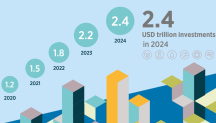

Coalition for Advancing Low Carbon Fuels Launches at COP22
Newsletter
A massive scale-up in renewable energy deployment is vital to fully decarbonize the global energy system by 2050, which is required to meet the ambitions of the Paris Agreement and keep global temperature rise to 2 degrees celsius. At the COP22 Climate Change Conference in Marrakech, Morocco, a 20-country coalition launched a new initiative to help decarbonize the transport and industry sectors through modern, sustainable low-carbon biofuels as alternatives to fossil fuels.
The Biofuture Platform aims to contribute to the global fight against climate change, nurturing solutions that can help countries reach their Nationally Determined Contribution, as well as to contribute towards the Sustainable Development Goals. The 20-country coalition comprises of Argentina, Brazil, Canada, China, Denmark, Egypt, Finland, France, India, Indonesia, Italy, Netherlands, Morocco, Mozambique, Paraguay, Philippines, Sweden, United Kingdom, United States of America and Uruguay.
The platform aims to address the challenges of scaling up a sustainable bioeconomy by promoting international collaboration in policy dialogue; research and development; and by facilitating an enabling environment for advanced low-carbon fuel and bioeconomy-related investments. The Launch Statement endorsed by the countries states that the initiative will also involve the private sector, other stakeholders and initiatives in a flexible operating model.
.jpg?la=en&hash=829E82578A0764F4E044D3BE3DA1FC3FAD1B6715)
“As we move to meet our goals for climate action and sustainable development, international cooperation, as exemplified by this platform, will only grow further in importance,” said IRENA Director-General Adnan Z. Amin at the launch event hosted by the government of Brazil.
“By working together through the Biofuture Platform, we can build a world where biofuels make a strong contribution to meeting these goals, bringing us closer to a sustainable energy future," said Mr. Amin.
The initiative stems from the urgent need for sustainable, immediately scalable solutions to reduce carbon emissions in the transport sector. "While the energy transition is well underway in the power sector, the greatest challenge we face now is to address end-use sectors like carbon-intensive industries and transportation," said Dolf Gielen, Director of IRENA's Innovation and Technology Centre in Bonn. "Transportation is the sector that has so far been one of the most challenging for mitigation and low carbon fuels are proving to be a viable alternative to reduce carbon intensity in the sector."
“In face of the urgency of fighting climate change, countries cannot afford to ignore the largely underestimated potential of bioenergy, especially in face of new technological developments which are opening the door to a whole new low-carbon bioeconomy as an alternative to fossil-based fuels, chemicals and materials," said the Minister of Environment of Brazil, Mr. Sarney Filho, who opened the launch event.
IRENA has recently released the Innovation Outlook: Advanced Liquid Biofuels which shows pathways to enhance the economics and market potentials. The second in the Innovation Outlook series reveals a global outlook for advanced liquid biofuel technology. It provides a detailed overview of the promising technological developments for commercialised advanced biofuel production to the year 2045.




